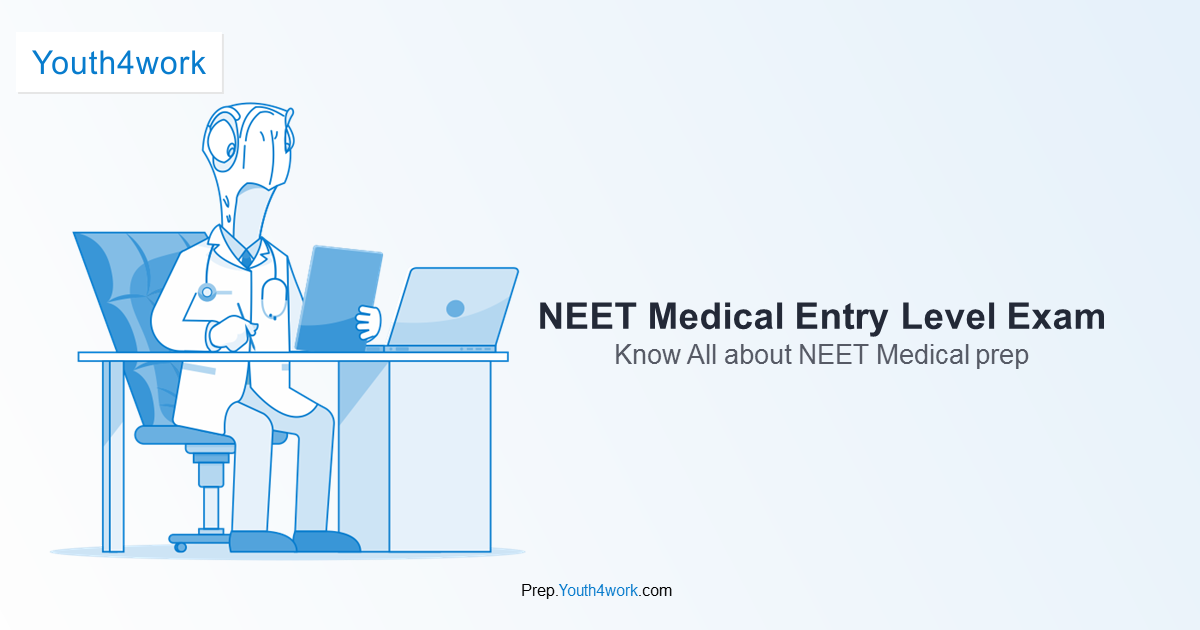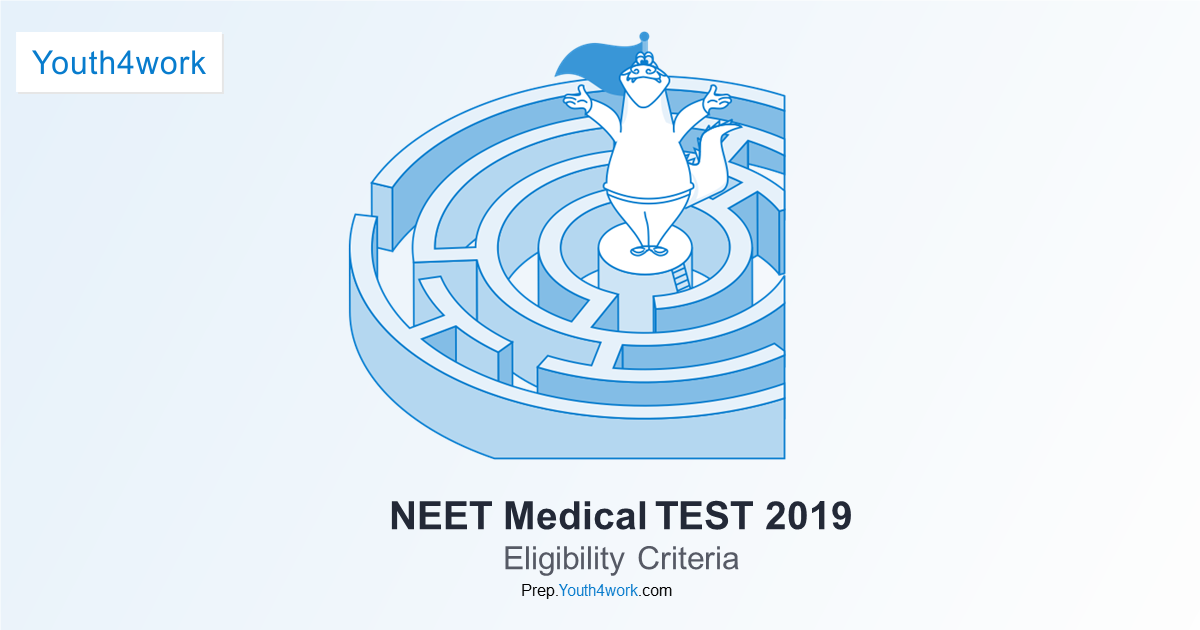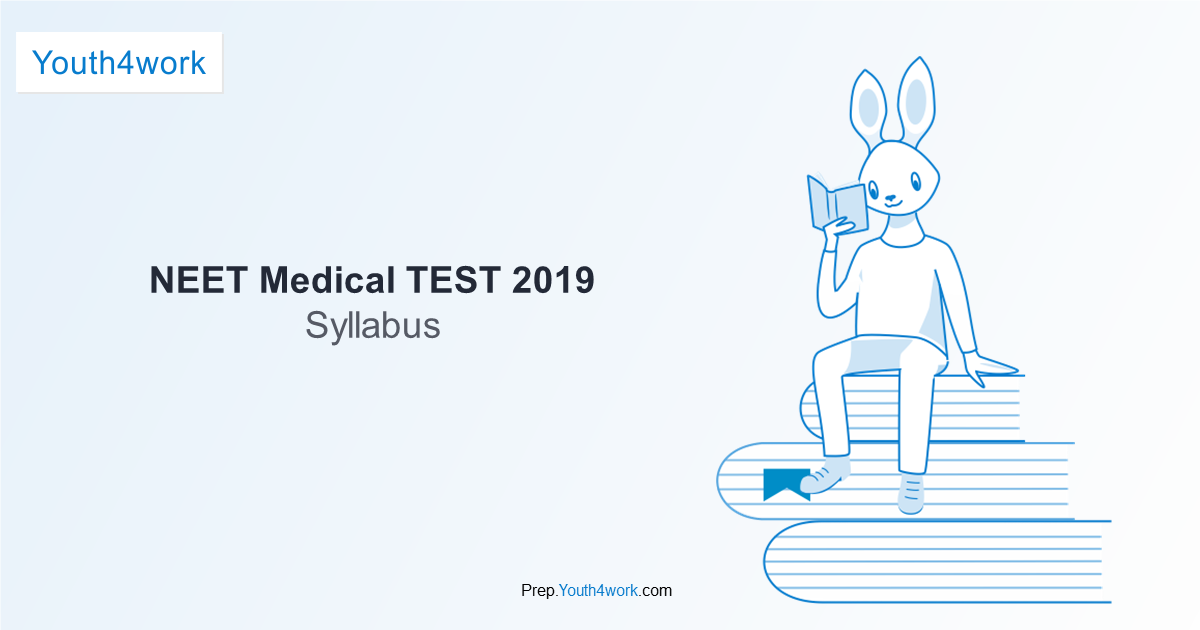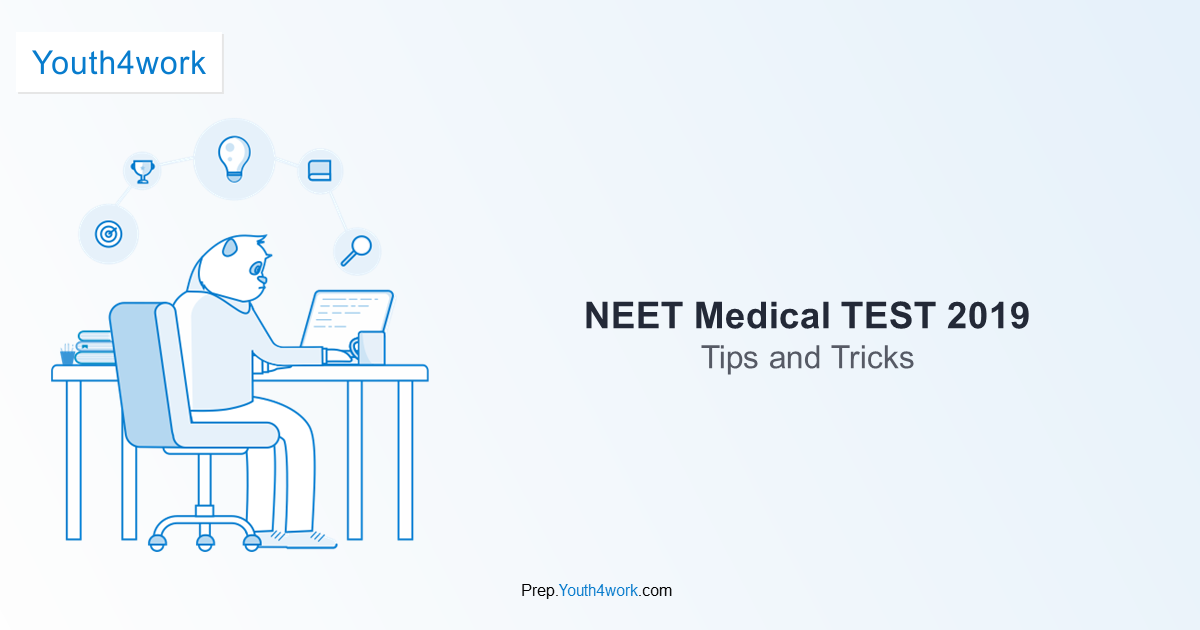NEET Exam Pattern, Eligibility, Syllabus, Previous Year Paper
AIPMT (All India Pre-Medical Test) is a national level entrance exam conducted every year for admissions in MBBS & BDS Programmes. It has now been renamed as NEET (National Eligibility Cum Entrance Test (UG). It is conducted by the CBSE ( Central Board of Secondary education). This exam is the national level undergraduate medical entrance exam for admission to MBBS & BDS programs. This exam is an online mode exam. The duration of the exam is 3 hours. It is divided into three sections - Physics, Chemistry & Biology (Botany & Zoology). There is a total of 180 questions carrying 4 marks each. Indian Nationals, Non-Resident Indians (NRIs), Overseas Citizens of India (OCIs), Persons of Indian Origin (PIOs) and Foreign Nationals are eligible to appear for NEET (UG) and 15% All India Quota Seats. Candidates have to score minimum marks as prescribed by CBSE in order to qualify the exam. Candidates are advised to attempt previous year question papers and mock tests to prepare well.
Important Dates | Application Process | Tips and Tricks | Take Free Mock Test | NEET PG Counselling
मुख्य हाइलाइट
NEET का

Registration Period:
Starts: Dec 02, 2019
Ends: Jan 06, 2020

Application fees:
General: Rs. 1500
Gen EWS/ OBC: Rs. 1400
Sc/ST/PwD: Rs. 800

Age Limit:
18 - 25 years

Educational qualifications:
Passed Class 12 with Physics, Chemistry, and Biology as compulsory subjects

Examination Level:
National

Exam Date:
September 13, 2020
Table of Contents
-
Important Dates for the NEET
-
NEET Selection Process
-
NEET Eligibility Criteria
-
NEET Application Form Filling
-
NEET Application Fee
-
NEET Admit Card
-
NEET Exam Pattern
-
NEET Syllabus
-
NEET Tips and Tricks
NEET Important Dates:
NEET (National Eligibility cum Entrance Test) will be an offline pen and paper-based test with 180 Objective MCQs in the exam that is required to be solved in 3 Hours (180 Minutes). NEET has been rescheduled as the COVID-19 Pandemic has altered the admission schedule:
-
The application forms have been available from December 02, 2019.
-
The last date to submit the NEET application is January 06, 2020.
-
The correction window for the NEET Application form was available from January 15 – January 31, 2020.
-
The correction window opened again for the registered applicants from May 15 – May 31, 2020.
-
The last correction window to edit the application form is available from July 04 – July 15, 2020.
-
The NEET admit cards can be downloaded 15 days before the examination.
-
NEET will be conducted in the offline mode on September 13, 2020, across 155 cities in the nation for approximately 15 Lakh applicants to maintain the social distancing norm amid the COVID-19 Pandemic.
-
The provisional answer key is expected to be released in the last week of September.
-
The final answer key is expected to be released in the first week of October.
-
The final results will be declared once the answer keys' objections will be answered in the last week of October.
NEET Selection Process:
The basic NEET Selection Process goes as:
-
NEET Test
-
NEET UG Counselling
NEET Eligibility Criteria:
The entrance examination conducted by NTA for admission in MBBS and BDS was no age barrier earlier, but the Supreme Court has set the upper age limit as 25 years to apply for NEET. The applicant must have qualified 10+2 examination with a minimum of 50% marks and have studied Physics, Chemistry, and Biology as the mandatory subjects. The applicant must have attained 17 years of age to be eligible for NEET.
-
The Indian applicants, NRIs, Overseas Citizens, Person of Indian Origin, and Foreign Nationals are eligible to apply for the NEET. Citizenship is no barrier to be eligible; the applicants will be given admission under State Quota and All India Quota, where 85% of seats fall under the State Quota and the remaining 15% under the All India Quota.
-
The eligibility criteria to take admission under quota is well specified; the applicant must fulfill the specific criteria to take admission. The applicants other than India's citizens are applicable to get admission in the All India Quota that is 15%. The applicants from the Union Territory of Jammu & Kashmir, Ladakh are eligible under the All India Quota when they produce the self-declaration. Such applicants will be able to get admission in a private/deemed university, AIIMS, JIPMER, or AFMC Pune.
The NEET Eligibility Criteria is defined here:
-
Age Limit:
-
The applicants must have completed 17 years of age to apply for the NEET.
-
There is a restriction to the upper age of 25 years for the general category applicants, whereas the reserved category applicants are provided with 5 years of relaxation to the age of 30.
-
-
Nationality:
-
The applicants who are applying for NEET should be an Indian Citizen.
-
The applicants who are Non-residents of India (NRI), Persons of Indian Origin (POI), Overseas Citizens of India (OCI), and Foreign Nationals are eligible to apply for the entrance test.
-
The admission will be based on the rules and regulations framed by the State Government, Institutions, and Government of India.
-
The applicants who are Foreign Nationals are required to confirm eligibility with the respective College or State.
-
-
Educational Qualifications:
-
The applicants must have qualified 10+2 examination with a minimum of 50% (for General category applicants) with Chemistry, Physics, and Biology as the mandatory subjects during the course of study.
-
The reserved category applicants are required to have 45% marks, and PH (Physically Handicap) applicants must have 40% marks in 10+2 to be eligible for NEET.
-
The applicants who have cleared the 12th examination in 2019, have appeared for the 12th exam in 2020, or have sit for the improvement exam of 2019 are considered eligible for NEET.
-
In counting the overall percentage, the mathematics score will not be considered for NEET.
-
NEET Application Form Filling
-
The applicants have to register on the official website of NTA (National testing Agency) within the registration period (ntaneet.nic.in)
-
The applicants have to Register themselves and enter personal information such as Name, Contact number, Email-ID, Password.
-
The login credentials will be sent on the verified email-ID and contact number.
-
The candidate must log in to the registration portal and enter the mandatory information such as Name, DOB, Gender, Category, Parents' name, nationality, and address.
-
The candidate has to upload the scanned photograph (passport size) and signature.
-
The academic qualifications are required to be entered at the very next step.
-
The candidate has to provide the experience details (if any) in the given tabs.
-
As the last step towards NEET Application Form Filling, the candidate must enter their test city center and course preference.
-
The candidates are advised to fill the application form carefully, and they should recheck the details filled by them before final submission.
-
The candidates should note down the registration number and password for future use.
-
They should print out the application form copy in a white blank paper to keep all the information with them for further use.
NEET Application Fee
-
NEET Registration Fee (General Category): Rs. 1500
-
NEET Registration Fee (General-EWS/OBC Non-Creamy Layer): Rs. 1400
-
NEET Registration Fee (SC/ST/PwD/Transgender): Rs. 800
NEET Admit Card
-
The admit card for the NEET test will be available before 7-8 days of the examination. The applicants can download the authentic admit card from the official website.
-
It is an essential document for the day of the test; the applicant has to carry it along with the valid ID proof.
-
The candidates should print the admit card on a white blank paper.
-
The text and information printed on the admit card should be visible.
-
The candidates are advised to save a copy of the admit card for future use.
-
The candidates should have clear information about the exam pattern and marking process before attempting the real exam.
-
The admit card will be available to download from the date to till exam.
-
Address and photograph of identity proof should be matched to the uploaded records.
NEET Exam Pattern
NEET is the gateway to have admission in India’s top government and private colleges in the undergraduate and postgraduate Medical and Dental courses. The exam will be an offline pen-paper-based test conducted in 155 cities by NTA (National Testing Agency). The exam will have 180 MCQs asked from the three subjects: Chemistry, Physics, and Biology. The time frame provided to solve the questions is 3 Hours (180 Minutes).
The marking scheme for the NEET is that each correct answer will give the candidate 4 marks, and 1 mark will be deducted from the candidate's score for every incorrect answer. The offline objective exam will be for 720 marks. The questions will be entirely from the curriculum of the 10th and 12th standards of Physics, Chemistry, and Biology. The exam will be available in 11 languages.
NEET (National Eligibility cum Entrance Test) has replaced the AIPMT (All India Para-Medical Test) and become the sole national-level entrance test for medical and dental courses. The exam dates are being rescheduled as the COVID-19 Pandemic is severely affecting everyone, so keeping the concern as the main focus, NEET has been postponed from July 26, 2020, to September 13, 2020. The dates are announced by the Human Resource Development Minister, Mr. Ramesh Pokhriyal, on July 03, 2020.
The applicants can apply for the NEET exam many times until they meet the maximum age eligibility. There is a limitation of the upper age as general category applicants can apply until 25. The applicants of the reserved category are provided with the age relaxation to 30 years.
Key Highlights of the NEET Exam Pattern:
-
Mode of Examination: Offline, Pen and Paper-Based Test
-
Medium of Exam: 11 languages; Hindi, English, Tamil, Telugu, Urdu, Assamese, Oriya, Bengali, Marathi, Gujarati, and Kannada
-
Type of Questions: Multiple-Choice Questions (MCQs)
-
Duration of the NEET: 3 hours (180 Minutes)
-
Total number of Questions: 180
-
Subjects covered in the NEET: 3
-
Physics: 45 Questions
-
Chemistry: 45 Questions
-
Biology: 90 Questions (Botany and Zoology, 45 questions from each subject)
-
-
Maximum marks for the exam: 720 marks
-
Physics: 180 marks
-
Chemistry:180 marks
-
Biology: 360 marks
-
-
+4 marks will be granted for every correct answer, and -1 mark will be subtracted from the score for every incorrect answer
-
No marks will be deducted for the left questions
-
Exam conducting authority: NTA (National Testing Agency)
NEET Syllabus
The exam will be divided into 3 sections: Chemistry, Physics, and Biology, where Botany and Zoology subjects will have an equal weightage with 45 questions under Biology. Each question will carry 4 marks, and 1 mark will be subtracted for attempting the question wrong.
The national-level entrance test will have the curriculum based on the three subjects of the 11th and 12th standard; the Medical Council of India sets the curriculum for the entrance examination. The uniform syllabus is required as students from different boards appear for the examination, making it difficult for one to crack. The syllabus is vast for NEET as both the 11th and 12th are incorporated in the entrance examination.
The complete NEET Syllabus is here:
- Physics:
Topics from 11th standard: Physical world and measurement, kinematics, laws of motion, work, energy and power, Motion of System of Particles and Rigid Body, Gravitation, Properties of Bulk Matter, Thermodynamics, The Behaviour of Perfect Gas and Kinetic Theory and Oscillations and Waves
Topics from 12th standard: Electrostatics, Current Electricity, Magnetic Effects of Current and Magnetism, Electromagnetic Induction and Alternating Currents, Electromagnetic Waves, Optics, Dual Nature of Matter and Radiation, Atoms and Nuclei, Electronic Devices
- Chemistry:
Topics from 11th standard: Some Basic Concepts of Chemistry, Structure of Atom, Classification of Elements and Periodicity in Properties, Chemical Bonding and Molecular Structure, States of Matter: Gases and Liquids, Equilibrium, Thermodynamics, Redox Reactions, Hydrogen, s-Block Element (Alkali and Alkaline earth metals), Some p-Block Elements, Organic Chemistry- Some Basic Principles and Techniques, Hydrocarbons and Environmental Chemistry
Topics from 12th standard: Solid State, Solutions, Electrochemistry, Chemical Kinetics, Surface Chemistry, General Principles and Processes of Isolation of Elements, p- Block Elements, d and f Block Elements, Coordination Compounds, Haloalkanes and Haloarenes, Alcohols, Phenols and Ethers, Aldehydes, Ketones, and Carboxylic Acids, Organic Compounds Containing Nitrogen, Biomolecules, Polymers and Chemistry in Everyday Life
- Biology:
Topics from 11th standard: Diversity in Living World, Structural Organization in Animals and Plants, Cell Structure and Function, Plant Physiology, Human physiology
Topics from 12th standard: Reproduction, Genetics and Evolution, Biology and Human Welfare, Biotechnology and Its Applications, Ecology and environment
NEET Tips and Tricks
-
The candidate must ensure that they are well-versed with the exam pattern and the syllabus for the entrance examination as the competition is huge in this field.
-
The candidate must attempt questions carefully as the score will greatly be affected by the number of incorrect answers.
-
The entire syllabus is based on the 11th and 12th curriculum of PCB, the applicant is required to prepare accordingly.
-
The best way to prepare for any examination is to go through the previous year's exams to ave a glimpse of the exam, practice with the available NEET Previous Year Papers.
-
Take online mock tests to know your strong areas and weak points to ensure the preparation is up to the mark, NEET Mock Tests.
Youth4work Prep Tests
Online practice tests for competitive exams – are very unique and popular among aspirants. Aspirants can take self-designed mock-tests as well as practice for sections and topics separately. Youth4work’s unique and proprietary technology is helping lakhs of aspirants to reveal personal details on what are the strength areas of aspirants for any exam and also suggest how they can improve the performance.
Following are interesting insights from over 2 lakh question attempts on NEET UG practice paper on Youth4work. Every aspirant is rated on a Rating Scale. The ratings of the aspirants change with every question.
डाउनलोड
केस स्टडी, नोट्स, पिछले साल पेपर
चर्चा मंच
समान प्रतिभा वाले युवक/युवती इस प्रश्न का शीघ्र उत्तर देंगे।








